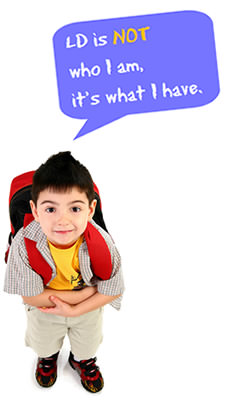The Ontario Human Rights Code of Ontario, 1981, Amended 1989, 2001, 2006) provides the right to freedom from discrimination based on “disability” in a number of areas, including:
- services, goods and facilities
- housing
- contracts
- employment, including application forms, job interview
- group membership
The Ontario Human Rights Code definitions of a disability include:
- a learning disability, or a dysfunction in one or more of the processes involved in understanding or using symbols or spoken language.
Under the Ontario Human Rights Code, persons with disabilities have the right to full integration and participation in society. They should be able to access services, employment, and housing, and face the same duties and responsibilities as everyone else.
Employers, landlords, service providers, and others have a duty to consider the needs of persons with disabilities up-front. This means designing for buildings, processes, programs or services inclusively. If existing physical structures, systems, or attitudes create barriers, they must be removed. Where it is not possible to remove barriers, special arrangements must be made so that persons with disabilities can fully participate. This is what is called accommodation.
Even when facilities and services are designed as inclusively as possible, some persons with disabilities may still require an accommodation to meet their individual needs. The duty to accommodate is the legal obligation that employers, unions, landlords and service providers have under the Code to meet the needs of persons with disabilities, unless to do so would cause undue hardship*. The goal of accommodation is to allow equal participation in, and benefit from, services, housing, or the workplace. Education is considered a service.
*undue hardship usually means that the service provider would have to prove that they do not have the ability to pay for the accommodation for this individual, or that the accommodation would create a risk to health and safety.
What if I have been denied accommodation and feel that I have been discriminated against?
A claim of discrimination or harassment can be brought to the Human Rights Tribunal of Ontario (HRTO) by filing an application. The HRTO handles all new human rights applications under the Ontario Human Rights Code and is the decision-making body for all applications claiming a violation of human rights under the Code.
The HRTO resolves applications by helping the parties settle the claim through its mediation process. If the parties do not agree to mediation, or mediation does not resolve the application, the HRTO holds a hearing to decide the application.
As the HRTO has the power to hold hearings, make decisions and order remedies, it is a quasi-judicial adjudicative agency. The decision-makers are called Vice-chairs, Members or adjudicators. All HRTO decision-makers are impartial and neutral with experience, knowledge and training in human rights law and issues. The HRTO also has staff who process applications.
Persons who want to make an application to the HRTO may ask for advice from the Human Rights Legal Support Centre (HRLSC). The Centre is independent of the HRTO and offers free services throughout the province, giving legal advice and other assistance to individuals who believe that another individual, an organization, corporation, or government agency or department has violated their rights under the Code. The HRLSC has produced a PowerPoint presentation on How to file a human rights application at the Human Rights Tribunal of Ontario.
People may also get help from other legal clinics, a private lawyer or a paralegal, or may choose to file an application on their own.


